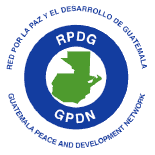IN CASE YOU ARE JOINING THE CAMPAIGN “TPS FOR GUATEMALA BY THANKSGIVING” HEREBY PRESENTED, WE ASK YOU TO PLEASE SEND, BEFORE TUESDAY, NOVEMBER 22, 2005 YOUR NAME AND CITY OF RESIDENCE TO THE FOLLOWING E-MAIL ADDRESS: tpsguatemala@agmausa.org. WE ALSO ASK YOU TO CONVEY THIS MESSAGE TO ALL PEOPLE WHO MAY BE SUPPORTIVE OF OUR CAUSE. MANY THANKS.
FRIENDS OF THE GUATEMALAN PEOPLE:
We, Guatemalan organizations in the United States and all organizations affiliated with the National Alliance of Latin American and Caribbean Communities (NALACC), address ourselves to you, in order to ask you to urgently associate yourselves with the e-mail letter that we are conveying to President Bush. In that letter we are calling on the U.S. Government to grant, based on the Immigration Law of 1990, Temporary Protective Status (TPS) to Guatemalan workers without a migratory visa in the United States. TPS would allow Guatemalans to stay and work in the United States and send much needed remittances home. You can associate yourself to this effort by providing your name as an endorser and your city of residence.
Death and damage caused by Hurricane Stan in Guatemala last October –thousands of dead, missing and injured persons; tens of thousands of displaced people and people in shelters; one-third of the national road infrastructure destroyed; and 30 per cent of all cultivated land ruined—make that country fully qualified for TPS, taking into account that such status applies to nationals of countries that are enduring an environmental disaster.
Soon after the disaster the Government of Guatemala, both unofficially and officially, requested that the U.S. Government grant TPS for Guatemalan nationals. The undersigned organizations and tens of thousands of Guatemalans and friends of Guatemala have made a similar request. Important figures in the United States, including senators and members of Congress, have also made appeals. So far, no response has come from President Bush, but we believe that with your support to our e-mail letter you can help obtain this measure of protection for Guatemalans in the United States.
We believe this is the right moment to increase our efforts in favor of TPS for Guatemalans. According to the UN World Food Program, Guatemala risks having more than 250,000 persons fall into a famine crisis by mid-December. We indeed need emergency help, but more importantly, we need new conditions for Guatemalans working in the United States to allow them to significantly increase their contributions to the country through their constant flow of remittances.
Sincerely,
Coalition of Guatemalan Immigrants in the United States, CONGUATE
Guatemala Peace and Development Network (GPDN)
National Alliance of Latin American and Caribbean Communities (NALACC)
LETTER TO PRESIDENT BUSH:
Dear President Bush,
We, Guatemalans and friends of the Guatemalan people, address ourselves to you in order to ask you to provide a positive response to the petition the Guatemalan Government has made, with the support of its civil society. Considering the death and damage caused by Hurricane Stan last October, Guatemala is asking for Temporary Protection Status (TPS) for Guatemalans working in the United States without a migratory visa.
In conformity with your frequently expressed view that compassion is one of the distinctive features of the Republican Party, and stressing the humanitarian concerns that support the request of TPS for Guatemala, as well as recognizing the tradition of solidarity of the United States of America towards afflicted peoples, we earnestly ask you to authorize TPS for Guatemalans as a particular present on Thanksgiving Day.
Sincerely,
Coalition of Guatemalan Immigrants in the United States (CONGUATE),
Guatemala Peace and Development Network (GPDN)
MEMBER ORGANIZATIONS OF THE NATIONAL ALLIANCE OF LATIN AMERICAN AND CARIBBEAN COMMUNITIES (NALACC):
Agencia Alpha, Boston, MA
America para Todos, Houston, TX
America International, Pasedena, TX
Asociacion Guatemalteca Americana (AGA), Miami, FL
Asociacion de Guatemaltecos Unidos de Lynn, Lynn, MA
Asociacion Hondureña de Houston, Houston, TX
Asociacion de Pueblos del Rincón, Chicago, IL
Asociacion Salvadoreña Americana, Sugarland, TX
Asociacion Tepeyac de New York, New York, NY
ASOSAL, Los Angeles, CA
Brazilian Immigrant Center, Allston, MA
CARECEN-LA, Los Angeles, CA
Casa Guanajuato, Chicago, IL
CEIBA: Chapines for Equality in the Bay Area, Oakland, CA
Centro Guatemalteco Tecun Uman, New York, NY
Centro Hispano Cuzcatlan, Jamaica, NY
Centro Presente, Cambridge, MA
Centro Romero, Chicago, IL
Chehuayo Grande, Chicago, IL
Club Francisco Villa, Chicago, IL
Club Morelia de Illinois, Chicago, IL
Club Taji Ciudad Hidalgo, Chicago, IL
CODEDE, Cincinnati, OH
Comité Centroamericano de Houston, Channelview, TX
Comité Guatemalteco Justicia y Paz, Cincinnati, OH
Comunidad Garifuna Guatemalteca (CONAFROGUA), Bronx, NY
CRECEN, Houston, TX
Dominican Development Center, Jamaica, FL
Durango Unido, Chicago, IL
Federacion de Clubes Michoacanos en Illinois, Chicago, IL
Federacion de Chihuahuenses, Chicago, IL
Federacion de Guerrerenses de Chicago, Chicago, IL
Federacion de Hidalguenses en Illinois, Chicago, IL
Federacion de Oaxaqueños del Medio Oeste (FOMO), Racine, WI
Federacion Jalisciences, Cicero, IL
Federacion de Zacatecas del Sur de California, Los Angeles, CA
Federacion Zacatecana, Chicago, IL
Frente Binacional Michoacano (FREBIMICH), Chicago, IL
Fundacion Salvadoreña de Florida, Fr. Lauderdale, FL
Garifuna Heritage Center for the Arts and Culture, Bronx, NY
Grupo Quetzal, Guatemaltecos y Amigos de Guate del Norte de California, CA
GUIA: Guatemala Unity Information Agency, Miami, FL
Hispanic Coalition, Miami, FL
Hondureños contra el SIDA, Bronx, NY
Hermandad Mexicana, Panorama City, CA
Honduran and International Parade Committee, Bronx, NY
Human Solidarity Organization, Mineola, NY
Instituto del Progreso Latino, Chicago, IL
La Voz de los de Abajo, Chicago, IL
Latinos Progresando, Chicago, IL
Latinos United, Chicago, IL
Libertas Forum on Colombian-American Issues, Montgomery Village, MD
Little Village Community Development Corporation, Chicago, IL
Mujeres Latinas en Accion, Chicago, IL
ONECA (Organización Negra Centroamericana), Bronx, NY
Proyecto de Trabajadores Latino Americanos, NY
Proyecto Hondureño de Massachussetts, Chelsea, MA
Raiz de Nuestros Ancestros, Bronx, NY
San Antonio Guaracha, Chicago, IL
SF-BayLACC, Oakland, CA
INDIVIDUAL AND COLLECTIVE SIGNATURES FOLLOW MUST BE EMAILED TO: tpsguatemala@agmausa.org
...

